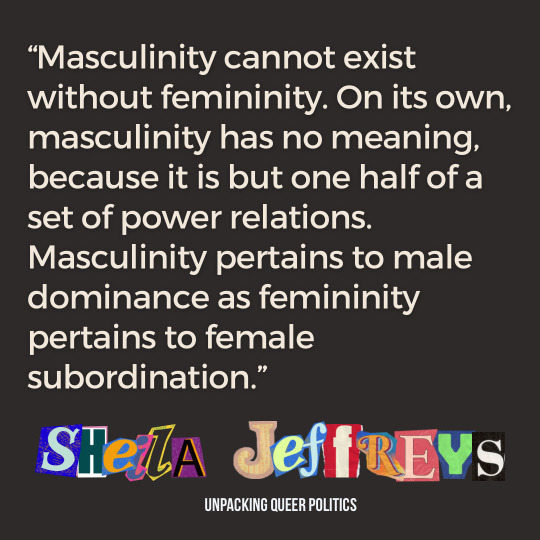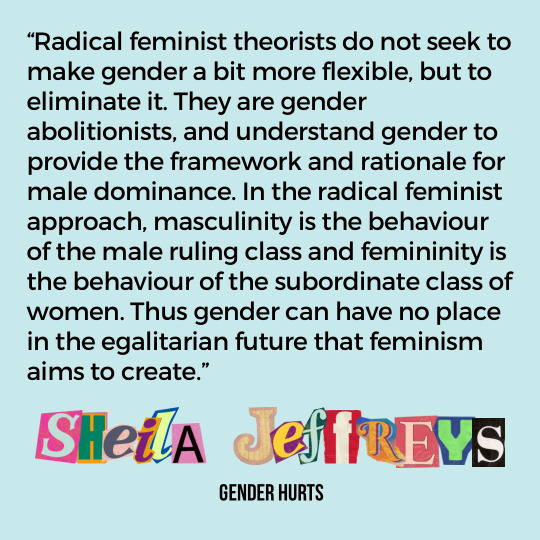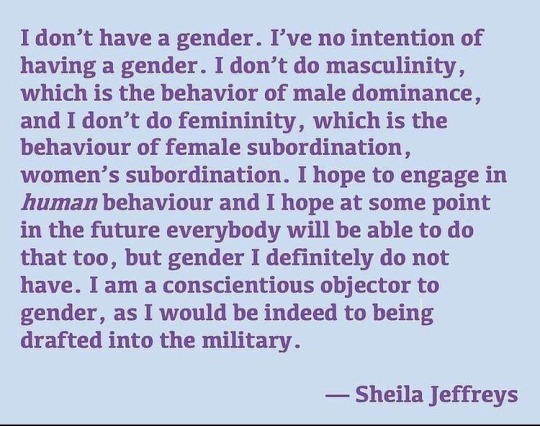#sheila jeffreys
Text
The huge difficulty that so many women and men have in seeing femininity and masculinity as socially constructed rather than natural, attests to the strength and force of culture. Women are, of course, understood to be 'different' from men in many ways, 'delicate, pretty, intuitive, unreasonable, maternal, non-muscular, lacking an organizing character'. Feminist theorists have shown that what is understood as 'feminine' behaviour is not simply socially constructed, but politically constructed, as the behaviour of a subordinate social group. Feminist social constructionists understand the task of feminism to be the destruction and elimination of what have been called 'sex roles' and are now more usually called 'gender'.
― Sheila Jeffreys
54 notes
·
View notes
Text

“Masculinity cannot exist without femininity. On its own, masculinity has no meaning, because it is but one half of a set of power relations. Masculinity pertains to male dominance as femininity pertains to female subordination.”
― Sheila Jeffreys, Unpacking Queer Politics
Edit: fixed a typo
217 notes
·
View notes
Text

Sheila Jeffreys, Beauty and Misogyny (2005)
563 notes
·
View notes
Text
"The idea of ‘gender’ arises from the oppression of women. Gender comprises the behaviour and appearance norms required of men and women. Femininity is the enforced behaviour of the oppressed, that is women, and includes humiliating clothing norms of high heels, depilation and body exposure or body covering, the restriction of body movement, taking up little space. It is based upon the false idea that women’s brains are somehow different from those of men in ways which make them suited to such appearance and behaviour and make them rightfully subordinate and more suited to doing housework. Masculinity is the behaviour of the powerful, and includes taking up space, the expression of confidence and control of boundaries in the form of striding, wearing dignified clothing, and not cleaning the toilet. Gender comprises the behaviour of two groups of people in a hierarchy of oppression, the subordinates, women, and the dominants, men."
—Sheila Jeffreys, Enforcing men’s sexual rights in international human rights law (pp. 2-3)
#radical feminism#gender abolition#sex role stereotypes#gender roles#sheila jeffreys#femininity#beauty culture
27 notes
·
View notes
Text
Amongst black gay Americans the impact of AIDS is very much more severe than amongst white gay men. A Centre for Disease Control study in 2001 found that among African-American gay and bisexual men aged twenty-three to twenty-nine 14.7 per cent were newly infected, compared with 2. 5 per cent of white and 3. 5 per cent of Latino men. Of all the men surveyed, 7 per cent of the white men were infected, 14 per cent of the Latino men, and 32 per cent of the African-American men (Osborne 2001).
Sheila Jeffreys, Unpacking Queer Politics
#not feminism but I didn't know this! thought i'd share it here#sheila jeffreys#unpacking queer politics#aids
10 notes
·
View notes
Text

Pornography as propaganda, according to feminist analysis, represents women as objects who love to be abused, and teaches men practices of degradation and abuse to carry out upon women.
Sheila Jeffreys
#feminism#canva#sheila jeffreys#radfem safe#anti-porn#anti-pornography#radfem#radblr#radfems interact#radfems please do touch#feminist
12 notes
·
View notes
Text
"Fundamental to a radical and lesbian feminist politics is the understanding that 'the personal is political'. This phrase has two interrelated meanings. It means that the political power structures of the 'public' world are reflected in the private world. Thus, for women in particular, the 'private' world of heterosexuality is not a realm of personal security, a haven from a heartless world, but an intimate realm in which their work is extracted and their bodies, sexuality and emotions are constrained and exploited for the benefits of individual men and the male supremacist political system. The very concept of 'privacy', as Catharine MacKinnon so cogently expresses it, 'has shielded the place of battery, marital rape, and women's exploited labor'. But the phrase has a complementary meaning, which is that the 'public' world of male power, the world of corporations, militaries and parliaments is founded upon this private subordination. The edifice of masculine power relations, from aggressive nuclear posturing to take-over bids, is constructed on the basis of its distinctiveness from the 'feminine' sphere and based upon the world of women which nurtures and services that male power. Transformation of the public world of masculine aggression, therefore, requires transformation of the relations that take place in 'private'. Public equality cannot derive from private slavery.
It is this understanding that differentiates radical feminist and radical lesbian politics from liberal feminist politics. Whereas liberal politics seeks equality in the public realm, radical feminist politics points out that a public realm constructed specifically from women's private subordination can never offer women 'equality'. This radical feminist approach casts great doubt upon lesbian and gay equality politics in which lesbians seek to be the equals of gay men, or attain some equality alongside gay men, with the privileges that heterosexual men derive from their dominance."
— Sheila Jeffreys, Unpacking Queer Politics, pp.145-6 (emphasis mine)
39 notes
·
View notes
Text
“Worldwide there are 51 million girls between 15 and 19 years who are married. In West Africa, South Asia, East and Central Africa 30 per cent or more of girls aged 15–19 are already married. The percentage of girls who are married before age 18 in Niger is 82 per cent, in Bangladesh 75 per cent, in Nepal 63 per cent, in India 57 per cent and in Uganda 50 per cent.”
Sheila Jeffreys, The Industrial Vagina (2008)
#quote#book quotes#sheila jeffreys#child bride#child marriage#trafficking#radfem#radical feminism#radical feminist#liberal feminism#liberal feminist#libfem#feminism#marxist feminist#marxist feminism#intersectional feminism#intersectionality#intersectional feminist#gender roles#gender#women#woman writers#Bengali#Ugandan#Nigerian#nepali#indian#s*xual abuse
27 notes
·
View notes
Text
Queer Post-modernism
In the past, 'queer' was commonly used as an insult towards those deemed lesbian or gay, and was considered a heinous slur by those of us at whom it was targeted. But today the term 'queer', when it is used in the neutral or affirmative manner, is an invention of post-modernism.
According to academic Matt Alberhasky: '"Queer" is a term "reclaimed" by the gay and lesbian community as a way to erase distinctions and include transgendered individuals'. The problem many lesbians have with the term 'queer' is that is depoliticises lesbians' experiences as women because the term is gender neutral. This, as the likes of feminist scholar Sheila Jeffreys have rightly argued, is another way of eliminating women.
– Julie Bindel (2017) The Pimping of Prostitution: Abolishing the Sex Work Myth, p. 278.
#julie bindel#the pimping of prostitution#matt alberhasky#slur#lgb#drop the rest#sheila jeffreys#academia#trans#lilac posts
2 notes
·
View notes
Text

“Radical feminist theorists do not seek to make gender a bit more flexible, but to eliminate it. They are gender abolitionists, and understand gender to provide the framework and rationale for male dominance. In the radical feminist approach, masculinity is the behaviour of the male ruling class and femininity is the behaviour of the subordinate class of women. Thus gender can have no place in the egalitarian future that feminism aims to create.”
― Sheila Jeffreys, Gender Hurts
Edit: fixed a typo
184 notes
·
View notes
Text
“Gay male theorists list transsexuals, the victims of sex-reassignment surgery, alongside transvestites as radical sexual revolutionaries. It is extremely rare for a gay man to venture into print in criticism of the phenomenon of transsexualism. The drag queens interviewed in Men in Frocks were mostly keen to establish that they had never had a desire to be other than male, but at the same time expressed sympathy with those who chose surgery. Tish, who operates under the stage name of Fay Presto, identifies as a pre-operative transsexual. He states unequivocally that the dividing lines between transvestism, drag and transsexualism are very blurred and that there is overlap between the categories.
TVs and TSs identify very closely with the gender they aspire to whereas most drag queens don't, though I know some drag queens who are a cigarette paper away from being TV or TS. People often drift round the areas. For me it was all a gradual process - I didn't just wake up one day and say, ‘Yesterday I was a TV, today I'm a TS.’
Such sentiments would be heresy to the medical profession which fosters the belief, in order to justify the savagery of surgical intervention, that it has discovered a unique and discrete, identifiable disorder in transsexualism. The doctors find it necessary to assert that there are people who can be classified as 'true' transsexuals. This blurring of distinctions would be anathema too, to most of those very numerous gay men who like to wear women's clothes. But for a feminist analysis the idea of there being a continuum between all these forms of gender fetishism makes most sense.
Janice Raymond's brilliant radical-feminist analysis, The Transsexual Empire, shows that transsexualism is not consonant with lesbianism or women's liberation. Raymond identifies the cause of transsexualism as the rigid gender stereotyping of male-supremacist society. This dictates that if a person feels uncomfortable in the gender that has been ascribed to them on the basis of their sex organs, then they have no choice but to switch organs.
I would suggest that a patriarchal society and its social currents of masculinity and femininity is the First Cause of transsexualism. The organs and body of the opposite sex that the transsexual desires merely incarnate the 'essence' of the desired role. Within such a society, the transsexual only exchanges one stereotype for the other, thus reinforcing the fabric by which a sexist society is held together.
Those in the medical profession, Raymond argues, benefit from the 'transsexual empire'. They are able to further their sexual knowledge and techniques, they make money and they receive the ego satisfaction of acting as male 'fathers' able to give surgical birth to remade human beings. It is in their interests therefore to explain the causation of transsexualism in ways which justify the continuance of surgical intervention.”
-Sheila Jeffreys, Anticlimax
101 notes
·
View notes
Text
I need to talk to someone who has read this book🥸🥸🥸🥸

3 notes
·
View notes
Text
Queer politics emerged in a very different political climate. In the late 1980s and early 1990s neoliberalism was at its unchallenged height. The 1990s was the time of TINA, There Is No Alternative’, the famous phrase of Margaret Thatcher. This was a time when deregulated rogue capitalism was allowed to appropriate the resources of the world and destroy the conditions of workers from the USA to Australia. It was a time when the feminist and anti-racist policies that had been adopted by education authorities and universities in the UK and the USA were being denounced as ‘political correctness’. The term ‘politically correct’ was a term of abuse used automatically and unthinkingly by many, whenever challenges were raised to practices which entrenched the rights and interests of rich white men. This was not an auspicious time for the creation of a radical politics, and indeed queer politics incorporated the contemporary biliousness to wards ‘political correctness’, and demonstrated the ways in which gay politics had capitulated to the economic imperatives of the time.
Sheila Jeffreys, Unpacking Queer Politics
3 notes
·
View notes
Quote
Masculinity cannot exist without femininity. On its own, masculinity has no meaning, because it is but one half of a set of power relations.
Sheila Jeffreys
15 notes
·
View notes
Text
here is a paper Sheila Jeffreys wrote about the eroticization of inequality btw
"Potentially sex could be a simple source of pleasure. It is not inevitably about violence and domination. But the sex of male supremacy is created out of women’s subordination and male dominance. Sex is not just a simple pleasure but politically constructed to maintain male dominance. Through sexual pleasure men, and, unfortunately women too, can obtain excitement from women’s subordination. The difference that is celebrated in the sex of male supremacy is the difference of power between men and women. It is power difference that is eroticised."
40 notes
·
View notes
